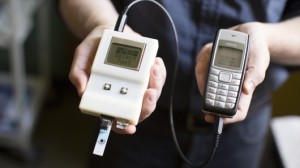
The device vibrates the test strip to mix the sample and reagent runs an electric current through it, and spits out the results on the screen.
Credit: Stephanie Mitchell
The researchers at Harvard University have devised a new portable device that has the ability to perform an abundance of medical tests – all thanks to electrochemistry.
“By applying a small amount of electricity to a drop of blood mixed with a reagent, the device can gauge glucose levels. The same goes for heavy metals in water, malaria antigens in blood, and sodium in urine,” researchers explained.
The beauty of the device lies in its simplicity and affordability. The total manufacturing costs comes in at $25, making it accessible to many. It also has an audio-out port, which allows users to transmit their readings via a cellphone to an online server.
This from Proceedings of the National Academy of Sciences:
The electrochemical methods that we demonstrate enable quantitative, broadly applicable, and inexpensive sensing with flexibility based on a wide variety of important electroanalytical techniques (chronoamperometry, cyclic voltammetry, differential pulse voltammetry, square wave voltammetry, and potentiometry), each with different uses. Four applications demonstrate the analytical performance of the device: these involve the detection of (i) glucose in the blood for personal health, (ii) trace heavy metals (lead, cadmium, and zinc) in water for in-field environmental monitoring, (iii) sodium in urine for clinical analysis, and (iv) a malarial antigen (Plasmodium falciparum histidine-rich protein 2) for clinical research. The combination of these electrochemical capabilities in an affordable, handheld format that is compatible with any mobile phone or network worldwide guarantees that sophisticated diagnostic testing can be performed by users with a broad spectrum of needs, resources, and levels of technical expertise.
The new technology is currently in a field trial stage in India.
Find out more about the newest innovations in sensors via ECS’s Digital Library.


